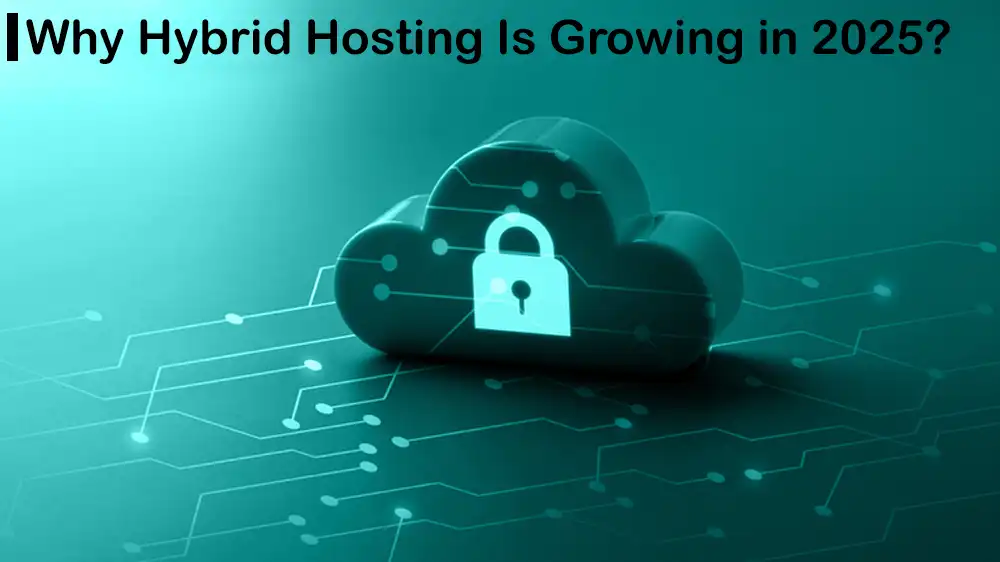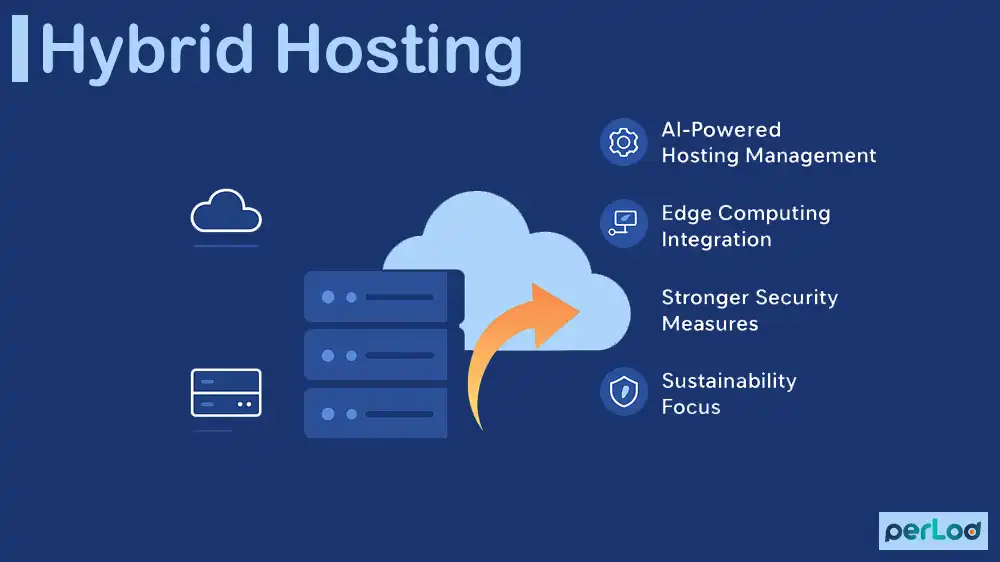
Hybrid Hosting Trends 2025
The hosting industry is growing fast, and businesses are looking for a reliable, flexible, secure, and cost-efficient hosting solution. Nowadays, Hybrid Hosting is becoming popular because of the security and performance of dedicated servers and the scalability of cloud services. In this article, we will explore hybrid hosting trends in 2025, compare cloud, dedicated, and hybrid hosting, and discuss what businesses can expect after 2025.
If you are looking for reliable and high-performance servers, Perlod Hosting offers both VPS and dedicated hosting solutions that are perfect for businesses of any size. Their flexible plans let you scale resources as needed while keeping your data secure.
Table of Contents
Discover Hosting Models | Cloud vs Dedicated vs Hybrid
Before we explain the hybrid trends, let’s understand these main hosting trends.
What is Cloud Hosting?
Cloud hosting uses multiple virtual servers connected instead of using a single physical machine. It gives you resources from a shared network. Cloud hosting allows you to increase or reduce server resources like CPU, memory, or storage instantly.
The downtime is minimized because the system uses multiple servers. Based on your usage, you can manage your budget and get your services from cloud providers.
Additionally, cloud providers have global server locations, providing faster and improved user experiences.
You must consider that you may have less security and control over your infrastructure, which may cause high costs during heavy traffic. Because of this, Dedicated Servers are making a comeback and a better hosting solution for businesses. To get more information, you can check this guide on Dedicated Servers 2025 Rising by AI and compliance.
What Is Dedicated Hosting?
Dedicated hosting means you have the entire physical server for your business. The resources are not shared like cloud hosting, and it gives you more control and performance. It provides you with maximum performance and control, strong security, and is best suited for high-traffic or compliance-heavy industries. Dedicated servers may have limited scalability and require expert management.
What Is Hybrid Hosting?
Hybrid hosting is a mix of cloud hosting and dedicated hosting, which brings the strengths of both. The main advantage of hybrid hosting is strong security with flexibility. Important data can stay safe on dedicated servers, while the cloud manages sudden changes in traffic.
It helps reduce costs because companies can decide which workloads run on the cloud and which stay on dedicated servers.
Another benefit is that hybrid hosting can be customized depending on business needs.
Also, it offers built-in redundancy; if one part of the system fails, another takes over, keeping services running smoothly and supporting disaster recovery.
However, Hybrid Hosting may be more complicated to set up than cloud and dedicated servers. It needs a skilled IT team or managed service providers to configure and maintain the system properly.
Advantages and Disadvantages of Cloud vs Dedicated vs Hybrid:
| Hosting Type | Advantages | Disadvantages |
| Cloud Hosting | – Scalable on demand – High uptime and reliability – Pay-as-you-go pricing – Global server locations for faster delivery | – Security risks if not configured properly – Unexpected costs during heavy traffic – Less control over infrastructure |
| Dedicated Hosting | – Maximum performance and control – Strong security (isolated environment) – Ideal for high-traffic or compliance-heavy industries | – Higher cost compared to cloud – Limited scalability (hardware dependent) – Requires expert management |
| Hybrid Hosting | – Combines security (dedicated) + flexibility (cloud) – Cost-efficient workload management – Customizable setups for business needs – Built-in redundancy for backup and recovery | – More complex to configure – Requires advanced IT skills or managed services |
Why Hybrid Hosting Is Growing in 2025?
Cloud hosting is flexible but sometimes too costly and less secure. Dedicated hosting is powerful but less scalable. Hybrid hosting balances both and makes it the most practical option.
In 2025, several reasons will make Hybrid Hosting popular. One of the biggest reasons is security concerns and data privacy. With strict rules like GDPR and CCPA, companies must handle personal information very carefully. Hybrid hosting helps businesses keep data safe on dedicated servers and still uses the cloud for customer-facing apps and websites.
Nowadays, AI and machine learning are growing fast, and they need a lot of computing power. Hybrid hosting allows businesses to run heavy AI tasks on dedicated servers while using the cloud for smaller, lighter processes that need to scale quickly. Also, hybrid hosting offers a cost-friendly solution.
Hybrid Hosting Trends in 2025
At this point, we want to take a look at Hybrid Hosting Trends in 2025:
1. AI-Powered Hosting Management: Artificial intelligence has a big effect on hosting. AI tools can help businesses to monitor traffic, detect threats, and automatically allocate resources.
2. Edge Computing and Hybrid Models: Hybrid hosting brings edge servers with cloud and dedicated systems to deliver faster services for IoT devices and real-time applications.
3. Renewable Energy and Advanced Cooling Systems: Hybrid hosting allows workloads to shift between greener data centers automatically.
4. Cybersecurity by Design: Hybrid hosting in 2025 has stronger encryption, AI-driven threat detection, and compliance-ready solutions.
5. Cost Optimization Platforms: New tools allow businesses to track hosting costs in real-time. They provide recommendations on whether a workload should stay on a dedicated server or move to the cloud.
6. Industry-Specific Solutions: Hybrid hosting providers are bringing services for industries like Healthcare, E-commerce, and Finance.

Future of Hosting Models After 2025
Cloud hosting will continue to be used for small businesses because of its low entry cost. However, because of the security issues, compliance, and high costs, businesses are going to use dedicated servers and hybrid solutions.
Dedicated hosting will not disappear in the future, and the requests for using it will become bigger.
Hybrid hosting is expected to become the standard model for most businesses in the future. With AI, automation, and edge computing integration, hybrid solutions will offer unmatched flexibility, performance, and security.
FAQs
Why is hybrid hosting popular in 2025?
Because it balances performance, security, and cost by using both a dedicated server and the cloud.
Is hybrid hosting more expensive than cloud hosting?
Not always. Hybrid hosting helps businesses avoid overspending by placing the right workloads in the right environment.
Will cloud and Dedicated hosting replace hybrid hosting?
No. Cloud and dedicated hosting will continue to be used, but hybrid hosting will be used for large businesses after 2025.
Final Words
Hybrid hosting trends in 2025 show that the future is about combining the best of cloud hosting and dedicated hosting. Businesses will focus on hybrid hosting solutions that deliver security and compliance, scale up and down without waste, support AI, IoT, and edge technologies, and also stay cost-efficient. In simple words, the future is hybrid.
We hope you enjoy reading this article. Stay updated with the latest hosting trends and news on X and Facebook.
Further Reading:
If you’d like to explore more about automation and modern infrastructure management, check out these related topics:
